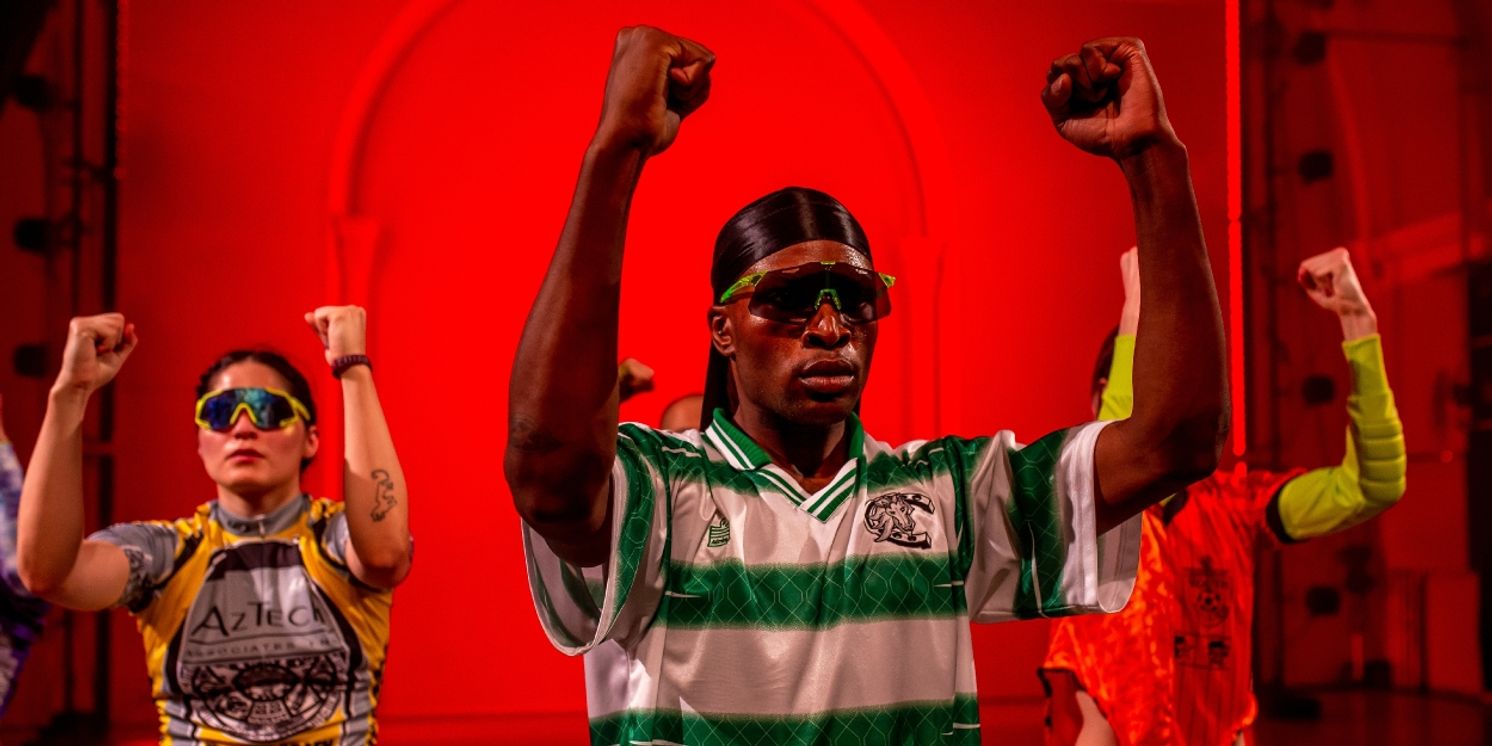Review: THE MAGIC OF ASSEMBLY at Winchester Street Theatre
Mashup of contemporary and street dance styles is wild and wonderful

THE MAGIC OF ASSEMBLY, a vibrant dance show running until February 11th at the Winchester Street Theatre, explores the "intersections of practice" between the respective contemporary dance and street dance backgrounds of Toronto Dance Theatre artistic director Andrew Tay and choreographer Ashley Colours Perez. Before the show, Tay explains the impetus behind bringing these two disparate but connected genres together: it's about the forms "vibrating" against one another, "making the invisible threads visible."
This assembly thrives on these visible threads, whether they're metaphorical threads between the dancers and the live electronic and vocal music provided by duo LAL (Rosina Kazi and Nicholas Murray), or literal threads created by a strange orange substance smeared on the dancers' bodies and then clapped into the air. It's sometimes coherent, and sometimes bewildering, but mostly, the experience is wild, wacky, and wonderful.
Perez's milieu is the dance genre of "Punking" or "Waacking/Whacking," which began in the 1970s as part of the underground gay community in Los Angeles. Punking predominantly uses a series of emotionally-driven poses that are designed to take up space in a room. Its evolution into Whacking employs mesmerizingly sharp, coordinated arm movements in striking motions around the head like a particularly unforgiving exercise class. The first things that hit the senses, however, are the bright hues of the rainbow neon lighting (by Gabriel Cropley) that streams from the side and back of the venue, and the equally-bright costumes (and, in some cases, hair) of the dancers.
An artful collage, these costumes designed by Angela Cabrera remix sports jerseys and early-90's chic windbreakers with corsets, tutus, ruffles, and other material, for example, fusing a track suit and a wedding dress. They're euphorically gender-bending and just plain fun to look at. We get a good, long look, because the show starts with a silent incantation, dancers moving to surround the bleachers and passing their hands over the spectators. The moment is eventually interrupted by instant messaging sounds...and soon, an insistent drum.
Then, the contortions begin. Tongue firmly in cheek (and leg firmly over head), dancers mimic a series of individual actions, from a golf swing to a bobsled run; in a particularly entertaining moment, one dancer dials her own foot like a phone, then proceeds to answer it. Sitting on an amp, Kazi provides the vocal as a consistent background wash, with ethereal riffs about everything from birth to the meeting of strangers. "You are the one thing I am sure of," she intones, or "Save me from finding myself."
The aural soundscape of the show is clever and entertaining. Amps aren't only seats or footrests; they're cradled in the fetal position, moved around the stage so that the sound travels around individual areas, and even packed off behind a back door to create the sensation of a hot club party happening just in another room. On opening night, the audience cheered when that door was later opened and the party came inside, accessible to us once more.
Whacking features heavily in the show's central number, a lengthy sequence that builds on individual dancers' rapid over-the-shoulder arm movements, composed with slight variations from each other. As more and more dancers join in, they form a pack, which seethes and vibrates in conjunction until someone splinters off. The dynamics are complicated by the added "coolness" factor of who gets to wear a pair of sunglasses in each sequence, an amusing touch that contrasts with the serious precision of the movements. It's hard to single out any dancer, because they move as such a well-oiled machine; yet, each (Yuichiro Inoue, Peter Kelly, Megumi Kokuba, Ryan Kostyniuk, Erin Poole, Devon Snell, Roberto Soria, Siwar Soria) has an individual personality, which gets expressed in short solos.
The slower sections lose some of the vibrancy of the wilder club numbers, but have their own appeal. In particular, the intensity of a dimly-lit choral section, which stacks dissonant tones and even the occasional howl from the performers, is hard to deny, as is that of the contrast between the following movements into tableaux.
However, the experience is at its best when it doesn't take itself completely seriously, providing sly, unsubtle visuals like the performers bringing out boxes of popcorn (that don't actually contain popcorn) to listen to the singer's eleventh-hour number.
As the dancers strip and make patterns with the strange orange slime, movement stills to behold the wispy, gossamer filaments that hang in the air. The image is striking. This was a moment that might have stretched a little further, with more variation, or perhaps given us a clearer callback to the beginning.
As anyone who's ever contemplated the meaning of life the morning after a wild night of clubbing might observe, the only thing we know for certain is we aren't here forever. That knowledge is a reminder that there's a certain magic in the times we assemble together.
Note: This presentation contains mild adult content (partial nudity), loud noises, flashing lights, and the use of fog. All in-person tickets are sold out, but there will be a livestream on Saturday February 4 ($5 - $15 tickets) and the recording will also remain on-demand to livestream ticket holders for 14 days after it airs, until Saturday February 18 at 7:30 p.m. EST.
Photo of Siwar Soria and Devon Snell in by Marlowe Porter.
Reader Reviews
Videos

